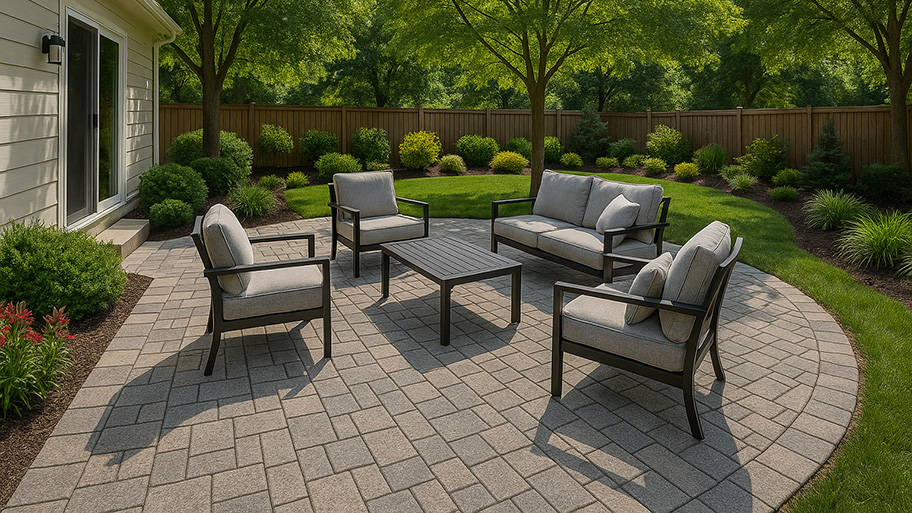
Thinking about installing concrete or brick pavers for a walkway or patio? Learn the cost of interlocking pavers in this informational guide.
Your landscape design is never set in stone, especially when you have so many to pick from


A local landscape contractor can help you narrow down the best pavers for your budget based on traction, drainage, and the amount of weight to support.
Cobblestone is a premium investment for driveways, and with regular maintenance, it can last a lifetime.
Granite pavers deliver a high-end natural look for less, plus they stand up to heavy foot traffic and freeze–thaw cycles.
Plastic pavers are a durable option that doesn’t crack as easily as concrete or natural stone; however, permeable versions can crack under the weight of a car.
Interlocking styles add stability and drainage, while making repairs easier.
Your lawn, flower beds, and shrubs may like to steal the landscape spotlight, but it's the paved elements of your yard that pull the whole look together. Pavers ensure that the most important surfaces of your yard remain durable, safe, and stylish—and they come in a long list of customizable varieties. If you're not sure where to start your paver purchasing journey, take a look at these 15 types of pavers for patios, driveways, and walkways.
Pavers are blocks of natural and manufactured stone that line the hardscape elements of a property, such as patios, walkways, driveways, and poolscapes. Unlike poured concrete, the pavers fit together individually like a puzzle and lie on top of gravel (or decomposed granite) and sand, mortar, or a concrete slab.
The benefits of pavers are numerous—from durability to stain resistance—and you can choose a paver best for your specific style, use, and how much you want to spend. Pavers cost anywhere between $8 and $50 per square foot, including installation, so your final bill widely ranges based on which one you pick.
Pavers come in a wide range of shapes, from interlocking hexagons to large, natural slabs that are all unique. Depending on the type of pavers, you'll find both DIY installation options and stones best left to professional hardscape experts near you. A hardscaping contractor can help lay out your design and install your new pavers.
The right paver for your project will come down to:
Cost of materials and installation
Durability and weight resistance, such as with driveways
Drainage and water retention, including slickness when wet
Color and style
Reaction to stains and cleaning materials
Installation options
Let's walk through the most common materials and design options for pavers for the major hardscape areas of your yard.
Begin by narrowing down your top favorite paver materials based on their natural or synthetic makeup. Installation and texture options may vary from stone to stone, but this list will help you choose the right durability, color, and price point for your yard.
Keep in mind that pavers require additional materials for installation. You’ll install pavers over a layer of sand and gravel (though some people also use decomposed granite). Gravel prices vary, and a base of decomposed granite costs $60 to $300 in addition to the cost of the pavers. You may also have to spend extra on landscaping costs, like regrading your yard, which levels out land and ensures proper drainage.
| Paver Material | Key Features | Average Cost (per square foot) |
|---|---|---|
| Natural Stone | Rustic look, uneven surface, heat and water resistant, highly sustainable | $15 - $50 |
| Brick | Classic earth-tone look, highly durable, but can fade in the sun and crack over time | $10 - $20 |
| Concrete | Comes in various textures and designs, generally more affordable, creates a smooth surface, and can handle heavy weight | $8 - $15 |
| Porcelain | Resistant to mold and mildew, great for high traffic areas, a wide range of colors and designs available | $35 |
| Rubber | Easy to clean, shock absorbent, slip-proof | $6 - $11 |
| Limestone | Softer than other paver materials. Porous structure. Slip-resistant and low maintenance. | $7 - $15 |
| Flagstone | Come in various shapes and textures, strong curb appeal, relatively fragile, and unsuitable for high-traffic areas | $12 - $40 |
| Bluestone | Comes with a unique blue-grey color; highly durable; slip-resistant and water-resistant | $12 |
| Cobblestone | Old school classic; more expensive than other paver options; highly durable | $20 - $70 |
| Granite | Weather and stain resistant; highly durable with a natural look. | $10 - $35 |
| Plastic | Extremely durable with efficient drainage, reduces pollution in runoff | $10 - $30 |

Some of the most popular hardscape pavers come naturally from the earth. They reflect the unique natural hues of your landscape and vary from piece to piece. Top natural stone options include fieldstone and travertine.
Homeowners commonly prefer natural pavers in their rustic, uneven state. They are either laid in sand or mortar over concrete, but due to their weight and fragility, are best left to the professionals to install.
Most natural stones are also resistant to water and heat, so you can use them in high-slip areas such as around the pool. Their strength makes them strong enough for driveways as well.
On the flip side, natural stone pavers are more expensive than some manufactured styles, coming in at $15 to $50 per square foot. The cost often depends on how accessible the stone is in your area.
| Pros | Cons |
|---|---|
| Beautiful natural variation | Fragile compared to other options |
| Heat-resistant | Requires sealing |
| Water-resistant | Higher cost |
Best for: High-slip areas and homeowners who want the look of natural stone

Brick pavers add a rich, deep earth tone to the facade of your home, increasing your curb appeal in the process. Brick either comes in its natural form as heated clay or as concrete and is dyed to look like the original. Natural brick pavers cost between $10 and $20 per square foot.
Brick pavers provide an incredibly strong and durable base for driveways, patios, and walkways. And while they can fade in the sun over time, speak with a local patio company about brick sealants.
It's important to seek an expert's help when laying brick pavers, as they can shift and crack over time, especially in high-use areas. They are also not as slip-resistant as other materials.
| Pros | Cons |
|---|---|
| Classic look | Can fade in sun |
| High durability | Can shift or crack over time |
| Works well in many applications | Not as slip-resistant as other pavers |
Best for: Shaded driveways, patios, and walkways

You'll find individual concrete pavers, as well as what's known as "stamped" concrete—or laid concrete stamped into a pattern to give the appearance of pavers. Concrete is one of the most budget-friendly options on our list, coming in at $8 to $15 per square foot.
You'll have your pick of colors, shapes, and textured concrete pavers due to their moldability. However, concrete is not very permeable, so your contractor must lay out the pavers to encourage proper drainage. Like brick, add a sealant to retain its color and protect it against stains.
| Pros | Cons |
|---|---|
| Budget-friendly | Incorrect installation can cause drainage issues |
| Variety of textures and designs | Requires sealing |
| Customizable | Can crack during the freeze-thaw cycle |
Best for: Homeowners on a budget, custom designs, and driveways
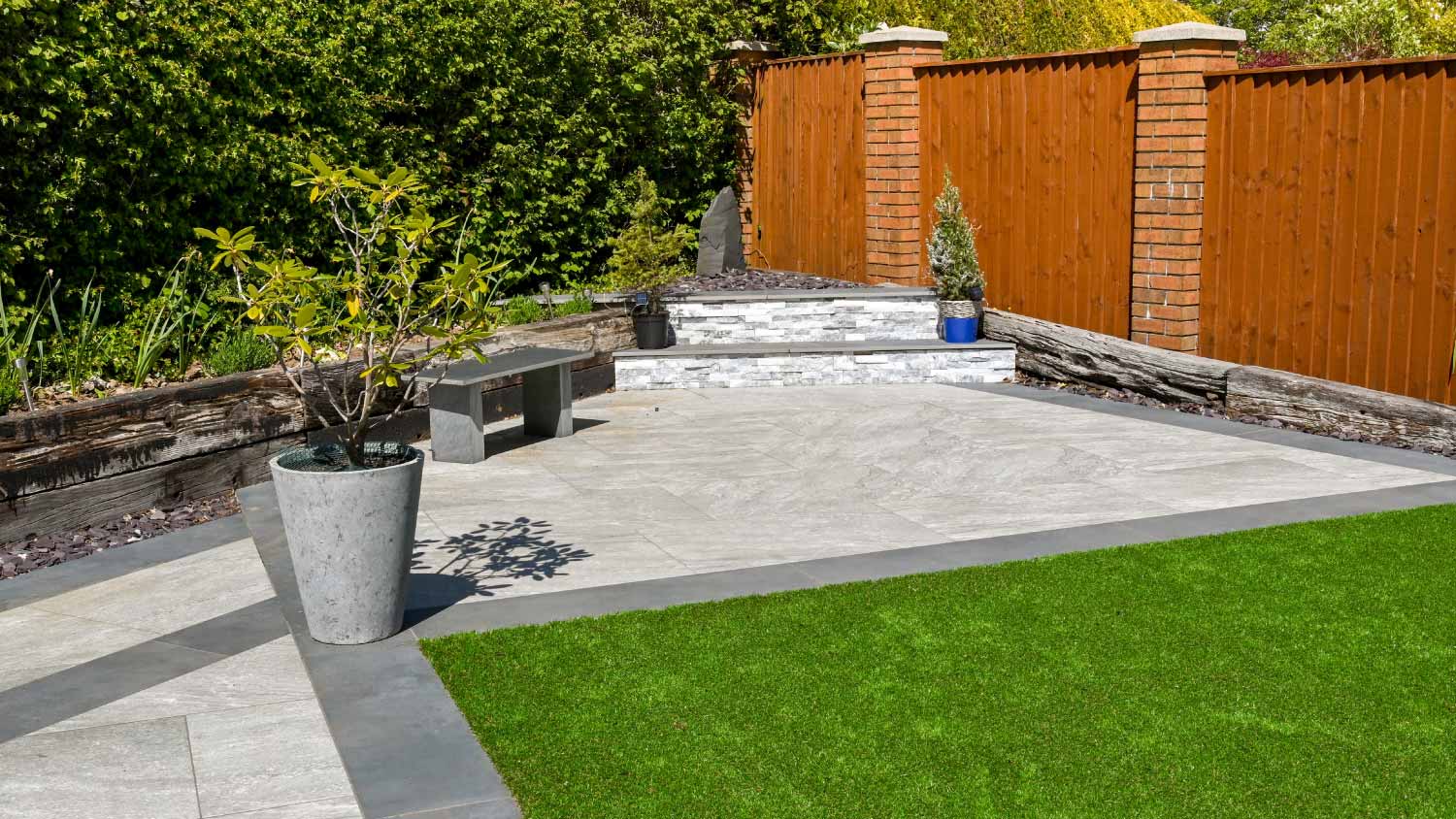
Porcelain comes from highly heated clay-like raw materials. Its extreme durability makes it a star for both kitchen counters and hardscape pavers. Porcelain is nearly impermeable to water, so it won't stain easily if you use them around the grill and won't grow mildew in a particularly humid year. Porcelain is also very durable for high-traffic areas and keeps its beauty when properly sealed.
Keep in mind that porcelain comes with a high price tag, averaging $35 per square foot. It is also not appropriate for DIY installation, as it can break and crack easily during the cutting and laying process.
| Pros | Cons |
|---|---|
| Resistant to stains, mold, and mildew | Brittle and can chip |
| Great for high-traffic areas | Higher cost |
| Large range of colors and designs | Not appropriate to DIY |
Best for: Covering existing concrete and homeowners who want to save time on maintenance
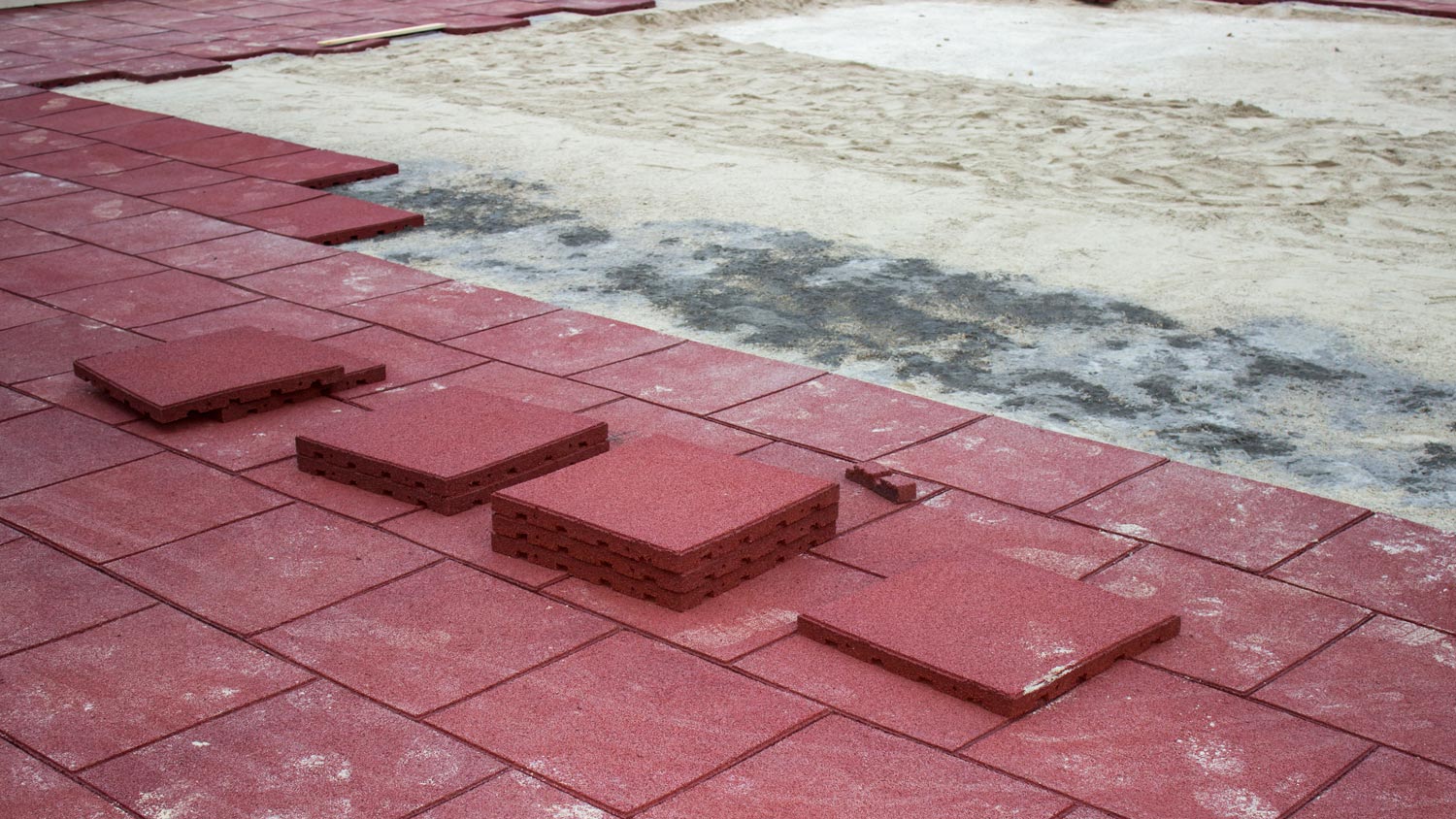
Rubber pavers are coming up in the world. They consist of recycled materials, making them an eco-friendly and user-friendly option. High-traffic areas for kids and active families enjoy its shock absorbency, slip resistance, and how easy it is to clean. You can also switch out a rubber paver more easily than solid stone.
Rubber pavers are not the best option for your driveway due to their lower durability. They're also not ideal for the front of your home or another area you're hoping to make a stylish statement. They are, however, quite cost-friendly, averaging just $6 to $11 per square foot.
| Pros | Cons |
|---|---|
| Easy to clean and maintain | Low durability |
| Shock-absorbent and slip-resistant | Some homeowners don’t like the look |
| Budget-friendly | Not suitable for driveways |
Best for: Homeowners on a budget and families with kids.
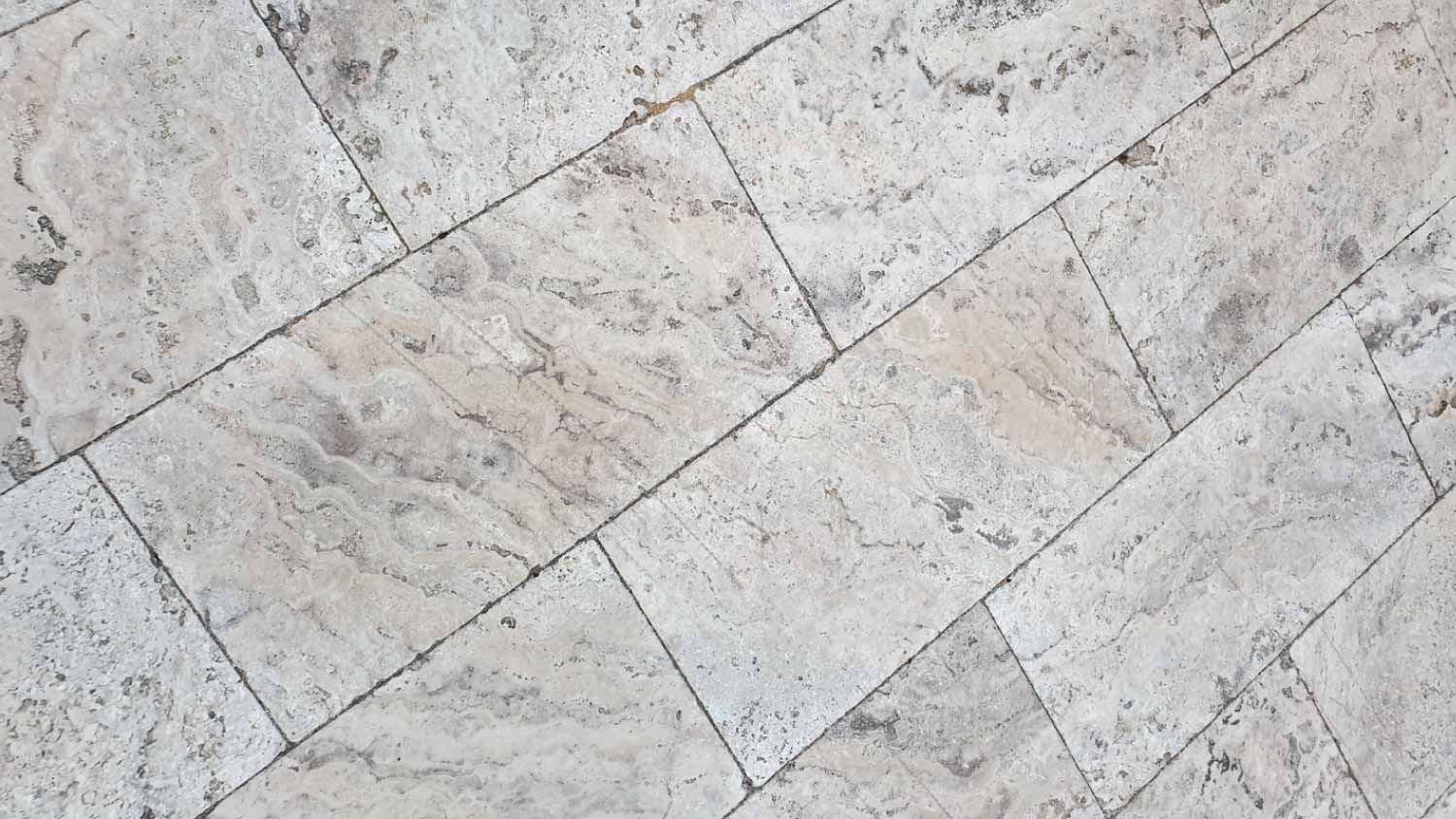
Limestone is a sedimentary rock that mostly consists of calcium carbonate. You’ll find limestone pavers in various earth-toned colors, from grayish beige to brown. Homeowners love this material because of its rustic, textured surface. The natural variation of the colors adds to their classic beauty, and they look great alongside the mulch in your flower beds.
That said, this is a porous stone. Low-quality limestone pavers are the softest and most porous, making them prone to issues like scratching and cracking. Instead, opt for high-density limestone pavers, which have less porosity, especially if you choose to install limestone around a pool. Your hardscape contractor can help you choose the best quality (and value) pavers for your specific project.
| Pros | Cons |
|---|---|
| Classic, rustic look | Can be soft and porous |
| Slip-resistant | Prone to staining |
| Low-maintenance | Limited color options and supply |
Best for: Around pools or other areas that may pose a slip risk and for homeowners who like the look of limestone
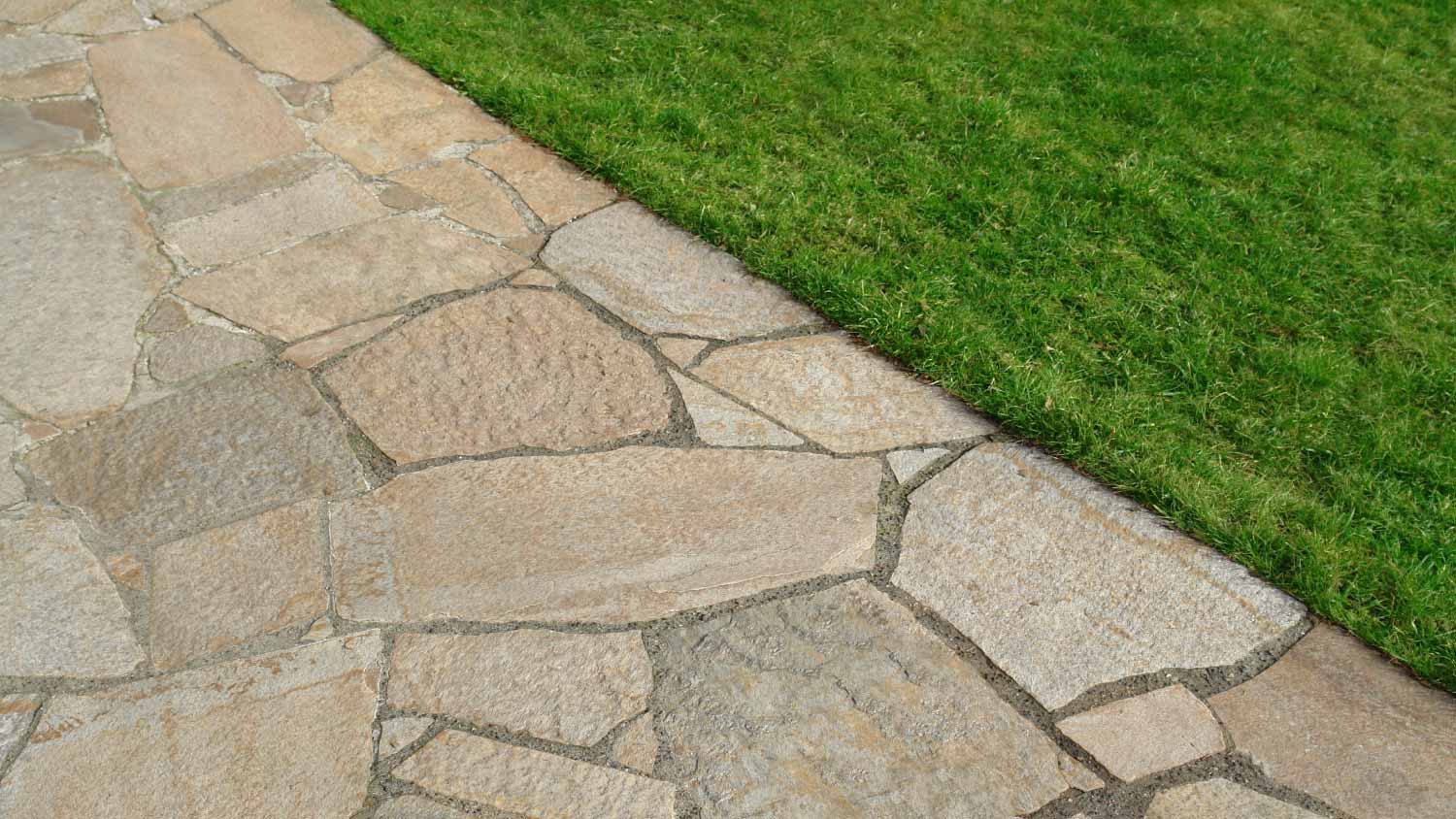
Flagstone is one of the most popular types of pavers made from natural stone—from red-tinged Colorado Red to ultra-textured sandstone to quartzite flagstone, a mix of sandstone and quartz.
Homeowners love flagstone because of its aesthetic and versatility. There is a wide range of options, and if you choose wisely, you can match your existing natural landscape. It provides a rustic look suitable for landscape curbing, patios, retaining walls, and garden walkways.
As a natural stone, flagstone costs more than other types of pavers and is among the most fragile (depending on the exact variety). Stone landscape curbing costs between $12 and $40 per square foot, whereas stone retaining walls cost an average of $25 per square foot. You could spend as much as $15 per square foot for a patio or walkway. It can also crack if you install it over concrete. Flagstone pavers perform best in low-traffic areas, but quartzite flagstone is slightly more durable.
| Pros | Cons |
|---|---|
| Desirable natural variation | Fragile compared to other pavers |
| Many different options | Can crack if installed over concrete |
| Widely available | Not always suitable for high-traffic areas |
Best for: Homeowners looking for variety and versatility in a natural stone
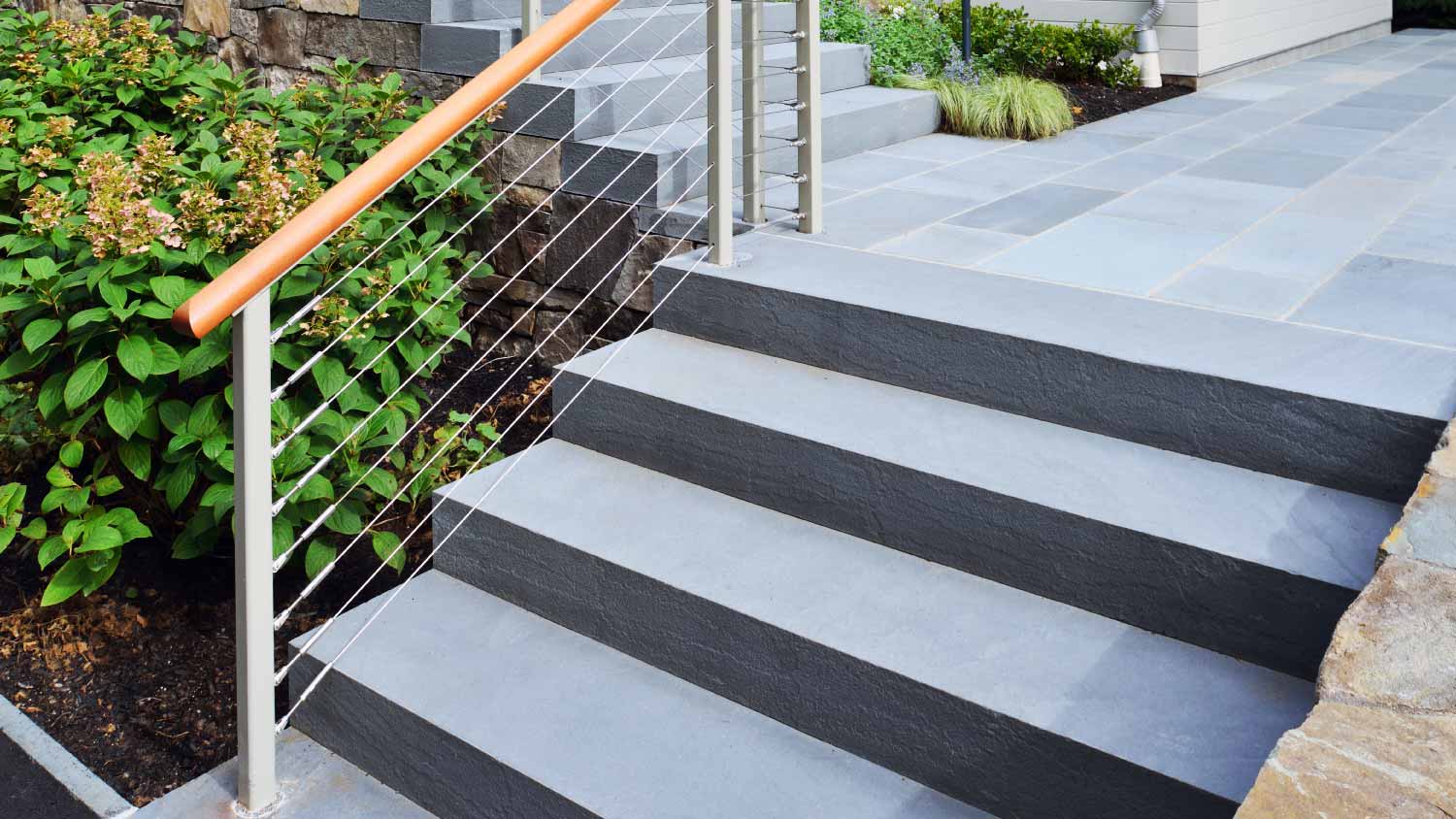
Bluestone is technically a type of flagstone, and its popularity comes from its high durability and blue-gray color. This natural stone can hold up the heavy weight of vehicles in a driveway and is not prone to cracking from extreme weather conditions.
Unfortunately, high durability comes with a higher cost. Depending on the type, bluestone can cost $12 per square foot. You’ll also need to seal it because it’s slightly porous. On top of that, this isn’t a great material if you plan to walk barefoot because it can get quite hot in the sun.
| Pros | Cons |
|---|---|
| Desirable blue-gray color | Higher cost |
| High durability | Requires sealing |
| Slip, stain, and water-resistant | Gets hot in the sun |
Best for: High-traffic areas, driveways, and areas with extreme weather
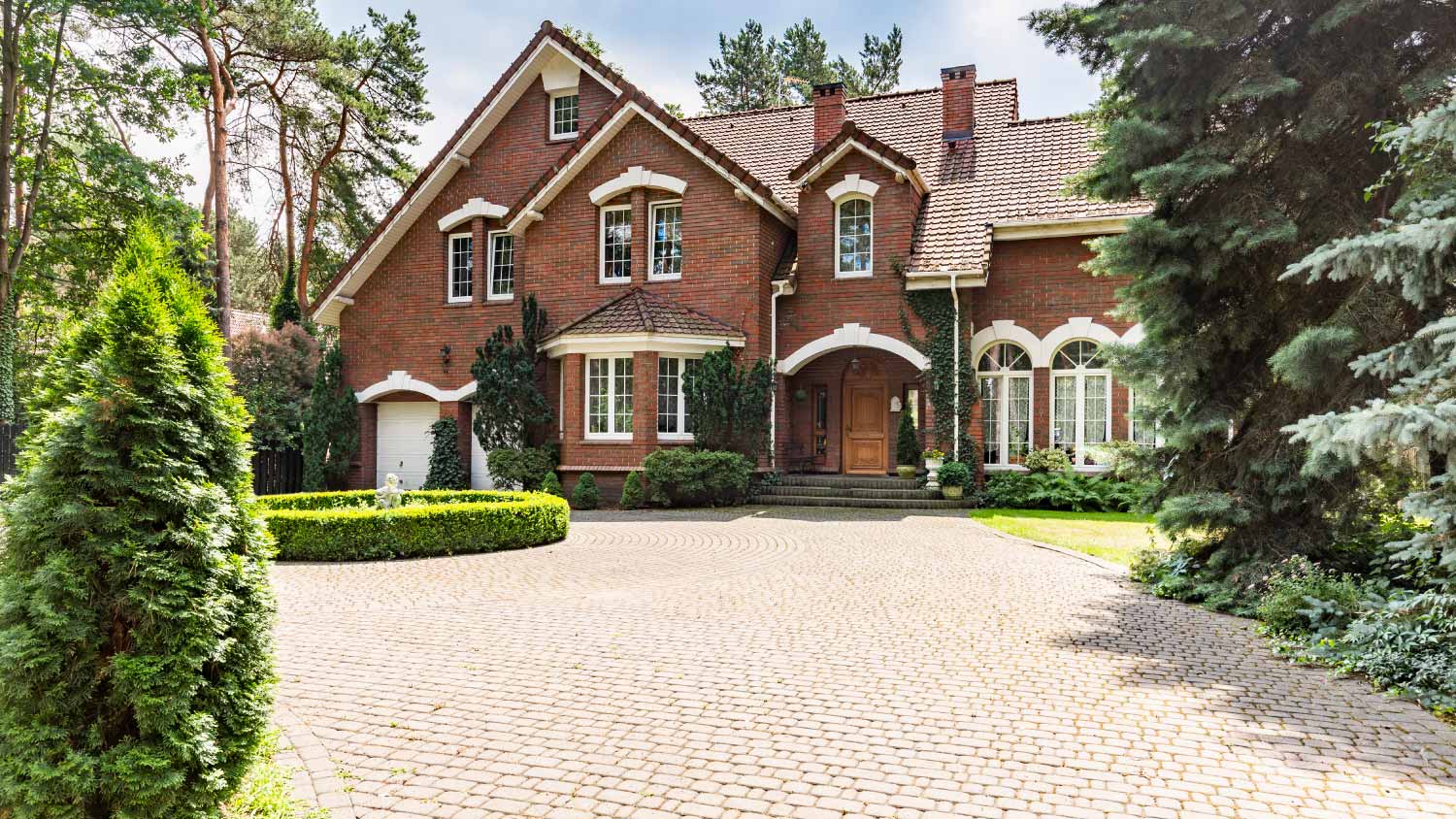
Cobblestone isn’t a traditional paver, but it’s an option with old-world charm and is made from natural stone, though you can find imitation cobblestone made from concrete. It’s most commonly used for driveways and walkways, channeling the streets of small European cities.
Unfortunately, cobblestone can be cost-prohibitive. You’ll pay anywhere from $20 to $70 per square foot for a driveway. In some cases, cobblestone can cost twice as much as concrete, but it can last a lifetime as long as you maintain it.
| Pros | Cons |
|---|---|
| Long life span | Higher cost |
| Unique, old-world charm | Can become uneven over time |
| High durability | More maintenance than other types |
Best for: Driveways, walkways, and homeowners who want the unique look of cobblestone
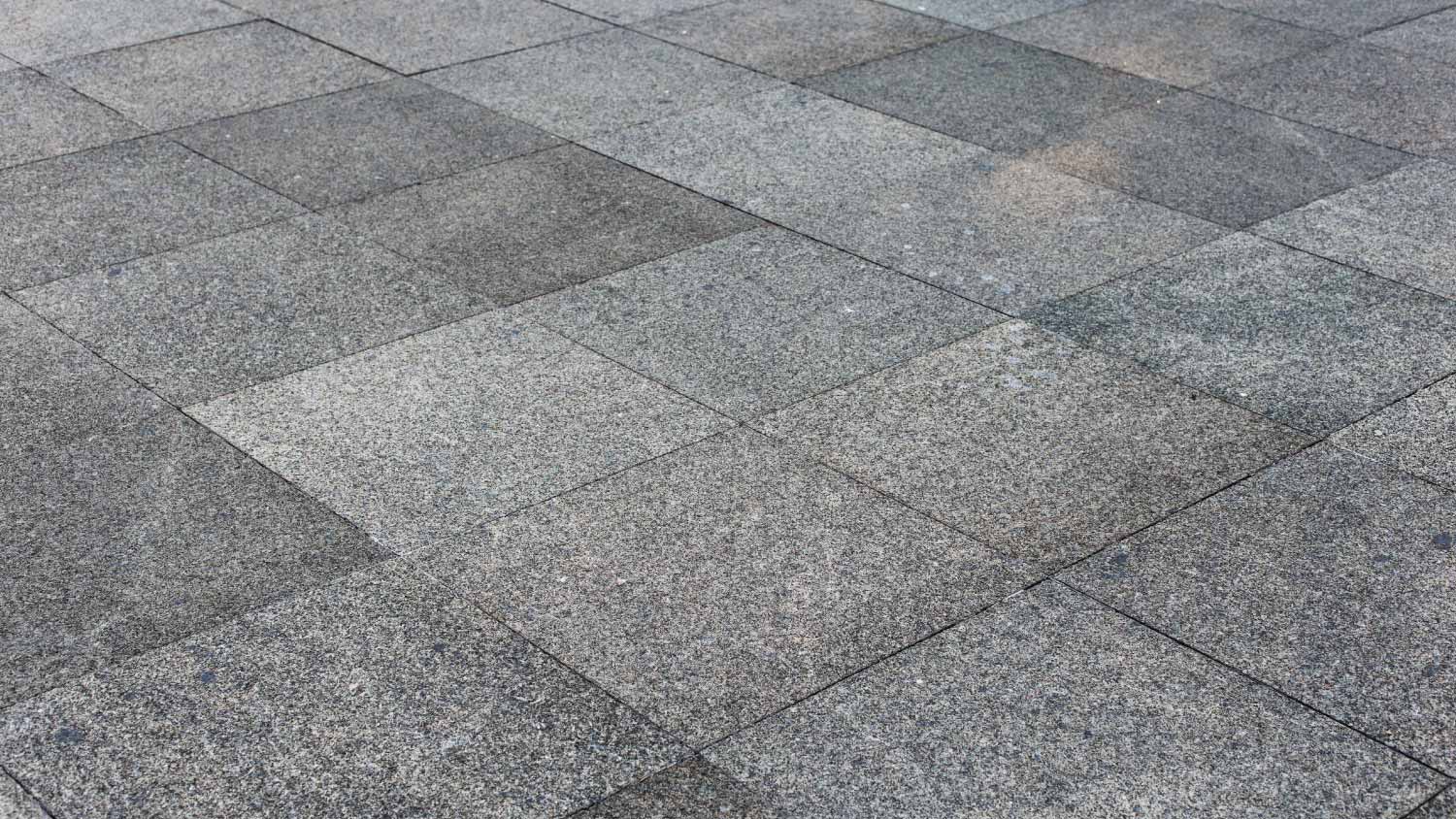
Granite is another type of natural stone with a notable high-end look. It’s one of the more durable stones and performs well in areas with lots of foot traffic. Though granite is porous, it has low absorption, so it resists stains and can withstand freeze-thaw cycles. Expect to spend $10 to $35 per square foot on this higher-end material.
| Pros | Cons |
|---|---|
| Desirable, natural look | Higher cost |
| High durability and abrasion-resistance | Porous and requires sealing |
| Resists stains and weather-related cracks | Can become slippery when wet |
Best for: High-end walkways and driveways
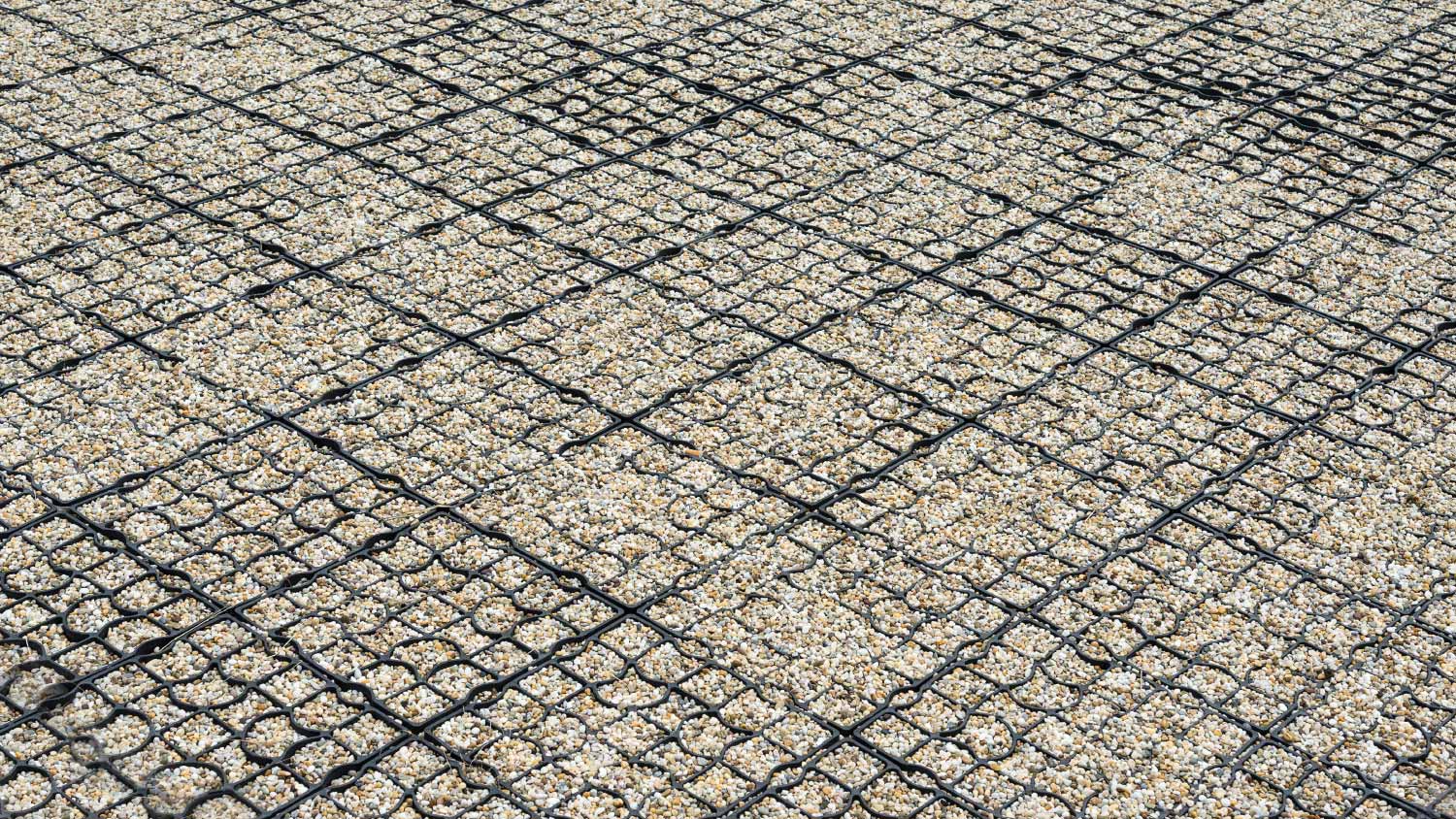
Plastic pavers are a durable option that is well-suited for high-traffic areas. They don’t crack like traditional concrete or natural stone pavers, and some have environmental benefits.
You can find interlocking composite or resin pavers, but the most popular plastic paver type is a permeable paver. These consist of recycled materials and act as a filtering system that removes pollution from rainwater. Since they’re absorptive, they also help prevent flooding. Most commonly, homeowners grow grass between pavers for a rustic appearance, but you can also install gravel to create a well-draining driveway or walkway.
Permeable pavers are on the high end of the price spectrum, at $10 to $30 per square foot, but they’re more durable and easier to replace than concrete pavers. Their durability does have limits, though. Permeable pavers can crack under the weight of a car.
| Pros | Cons |
|---|---|
| Aids with drainage | Higher cost |
| Helps reduce pollution in runoff | Some people don’t like the look |
| Extremely durable | Can potentially clog |
Best for: Areas with lots of foot traffic and environmentally conscious homeowners
Once you choose your favorite paver material, you'll have the chance to choose several unique finishes and construction styles. These extra perks aid in how pavers drain water, handle the weight of your car, or create a more slip-resistant surface when walking around your patio.
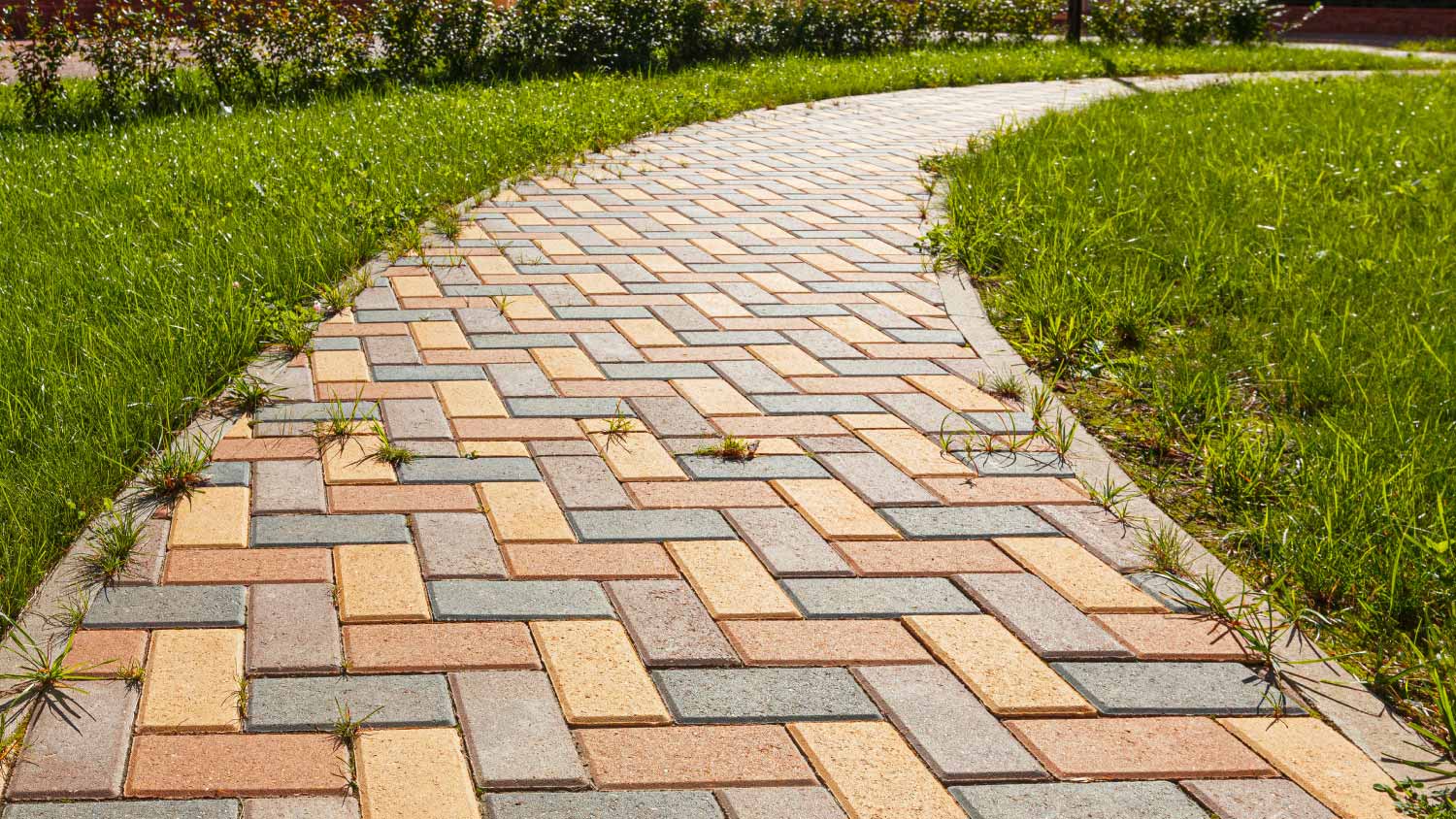
Many brick and concrete pavers come in interlocking shapes. Their unique structure makes them fit together like a puzzle piece, giving proper drainage and extreme stability against the weight of your car or an outdoor kitchen. If you need to replace a damaged tile or access the early below for plumbing work, the interlocking tiles pop out more easily than stone slabs, making installing interlocking pavers much easier.
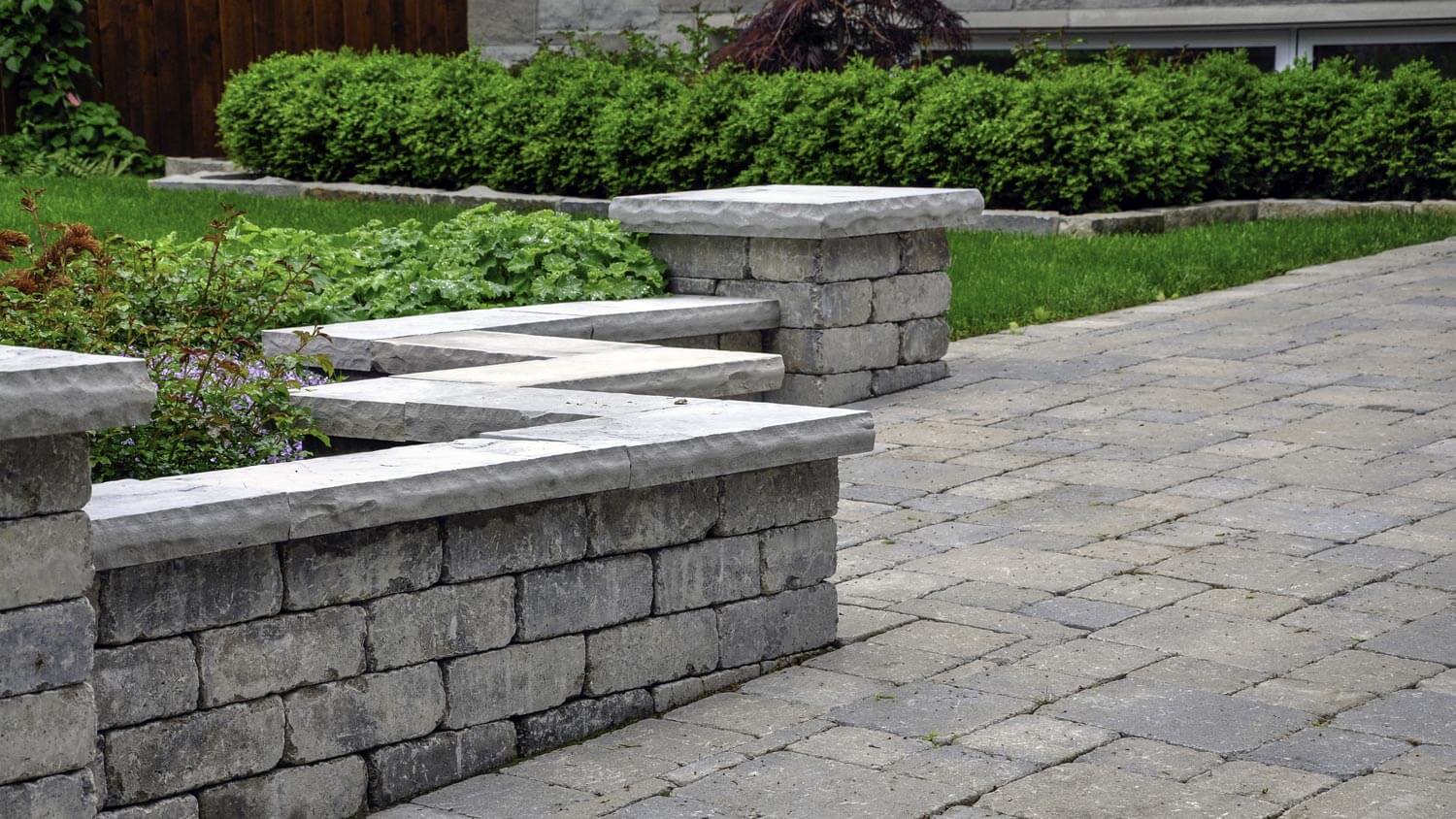
Tumbled pavers are just as they sound—they've been tumbled around slowly in a mixer for an extended period of time. In the end, the edges of the pavers become more naturally worn down, giving them a more unique appearance from stone to stone.
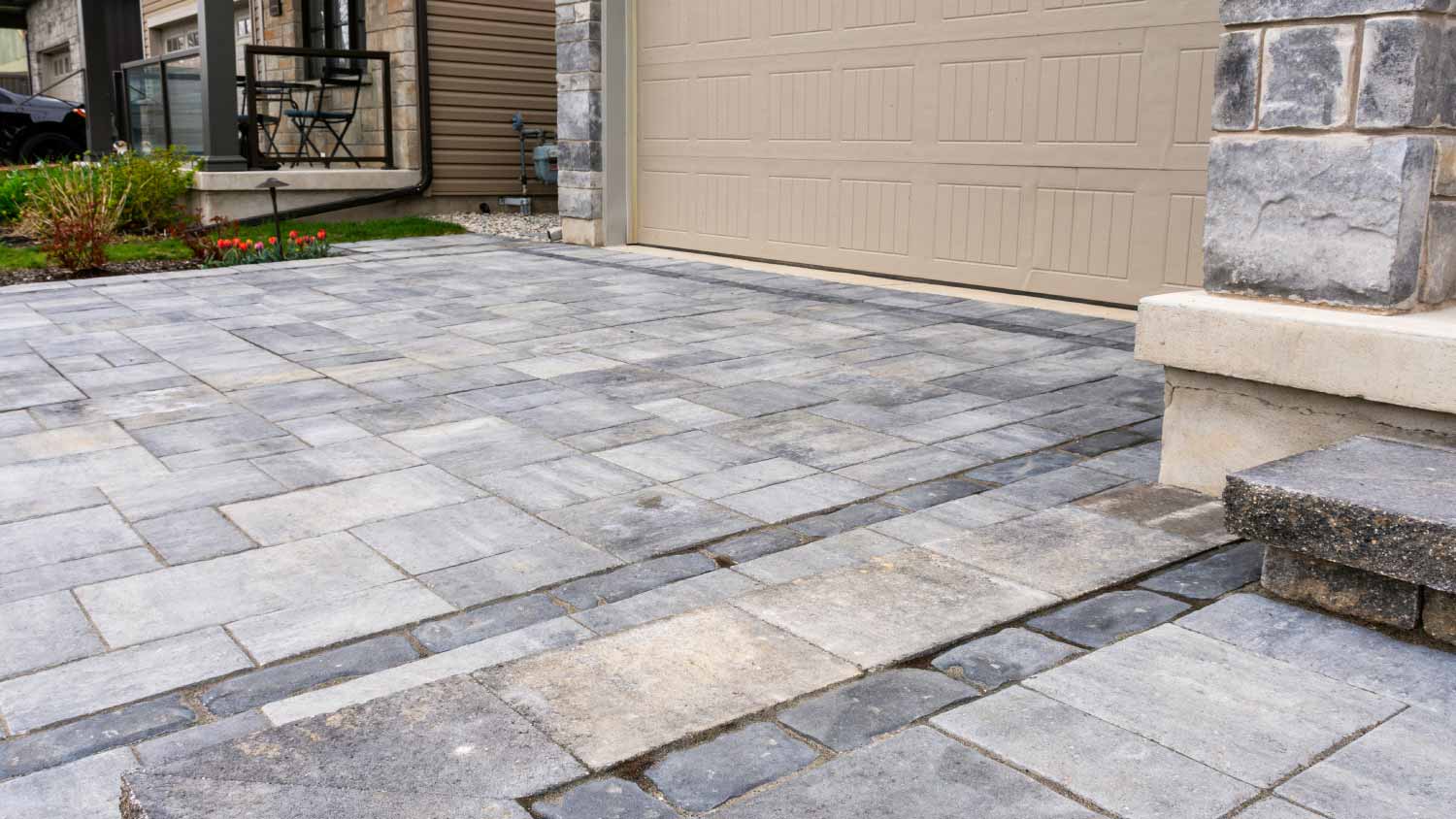
Designers can show off their unique artistic touch with a range of texturing effects. Not only does this provide a one-of-a-kind style, but it also makes stones and pavers less slippery after an afternoon rainstorm. Choose from a lightly chiseled look, select a range of edge styles, or even choose highly textured stones to give your landscape that "middle of the woods" feel.
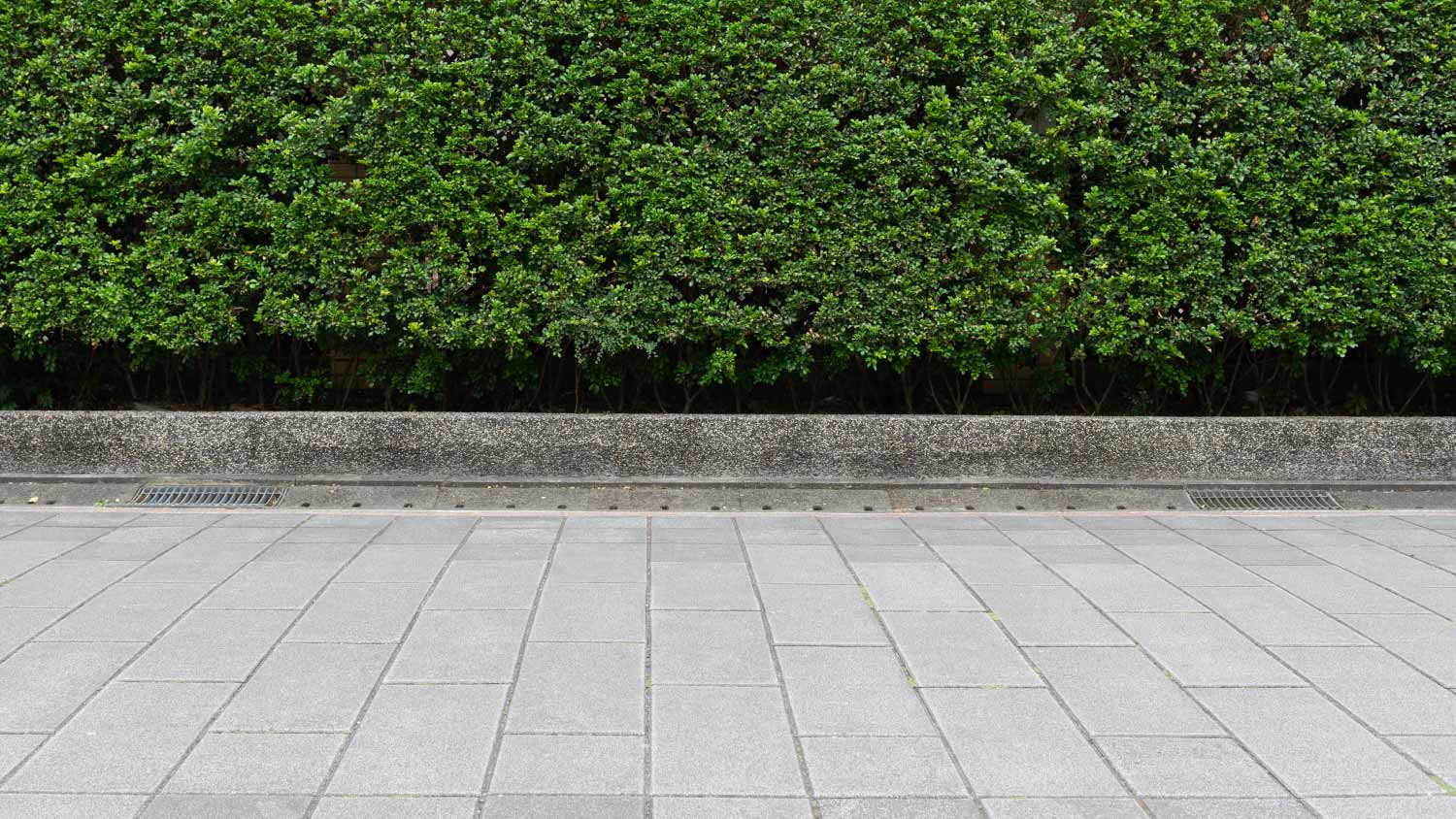
Save a bit of money with an untextured stone style that has the least amount of alterations. While these options can be a bit more slippery, they do provide a uniform look for a smooth and clean driveway or patio.
Most importantly, choose a paver that can withstand the unique needs of the surface. Patio, driveway, and pool deck pavers need to start up to water, weight, and usage in different ways, though this will vary depending on where you live and how you use your outdoor space. Narrowing down these extensive paver options can be tricky at first, so reach out to a local landscape design company to finish off your delicately balanced outdoor look.
Understanding your project's requirements is the first step in choosing the right pavers. How much traffic would the paver need to handle? Is it covered or exposed? Should it be functional or primarily decorative? These are important questions to ask before deciding on a specific paver material.
Pavers for patios should be slip-resistant, smooth, and somewhat durable. Best pavers for patios include concrete, brick, and porcelain. Natural stone pavers can also be a good choice, especially for uncovered patios or a pool patio.
Pavers for walkways should take into consideration aesthetics and accessibility. Concrete, flagstone, bluestone, and limestone pavers all work great as walkways. Among these options, concrete and limestone are friendlier for those with mobility issues due to their smooth surface and slip-resistant properties.
Pavers for driveways must be able to sustain the weight of your vehicles. You want weather-resistant and strong paver materials, such as concrete and brick pavers. A typical concrete paver driveway costs about $12,800, and a brick paver driveway costs about $19,200 on average. Note that concrete pavers will also need to be properly sealed to ensure their durability and weather resistance.
From average costs to expert advice, get all the answers you need to get your job done.

Thinking about installing concrete or brick pavers for a walkway or patio? Learn the cost of interlocking pavers in this informational guide.
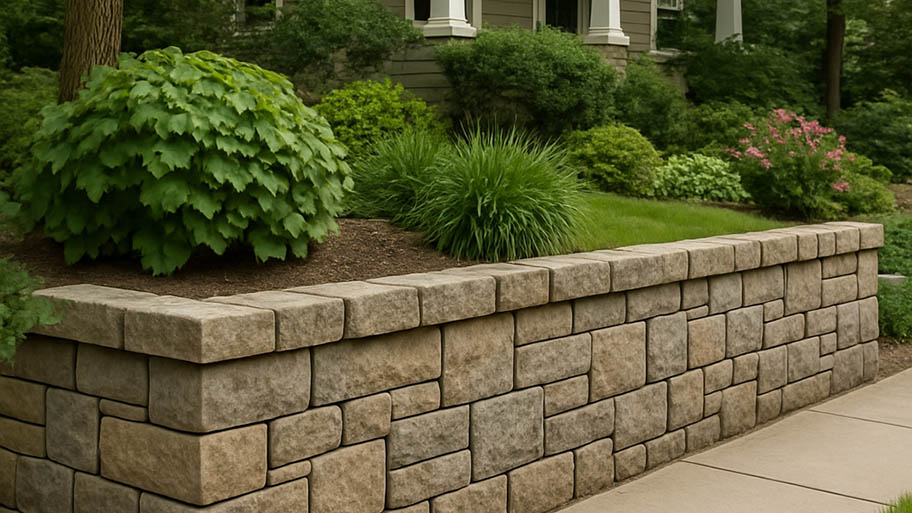
Kick erosion to the curb with an eye-catching retaining wall. Retaining wall costs vary based on the material, but this guide will help you budget.
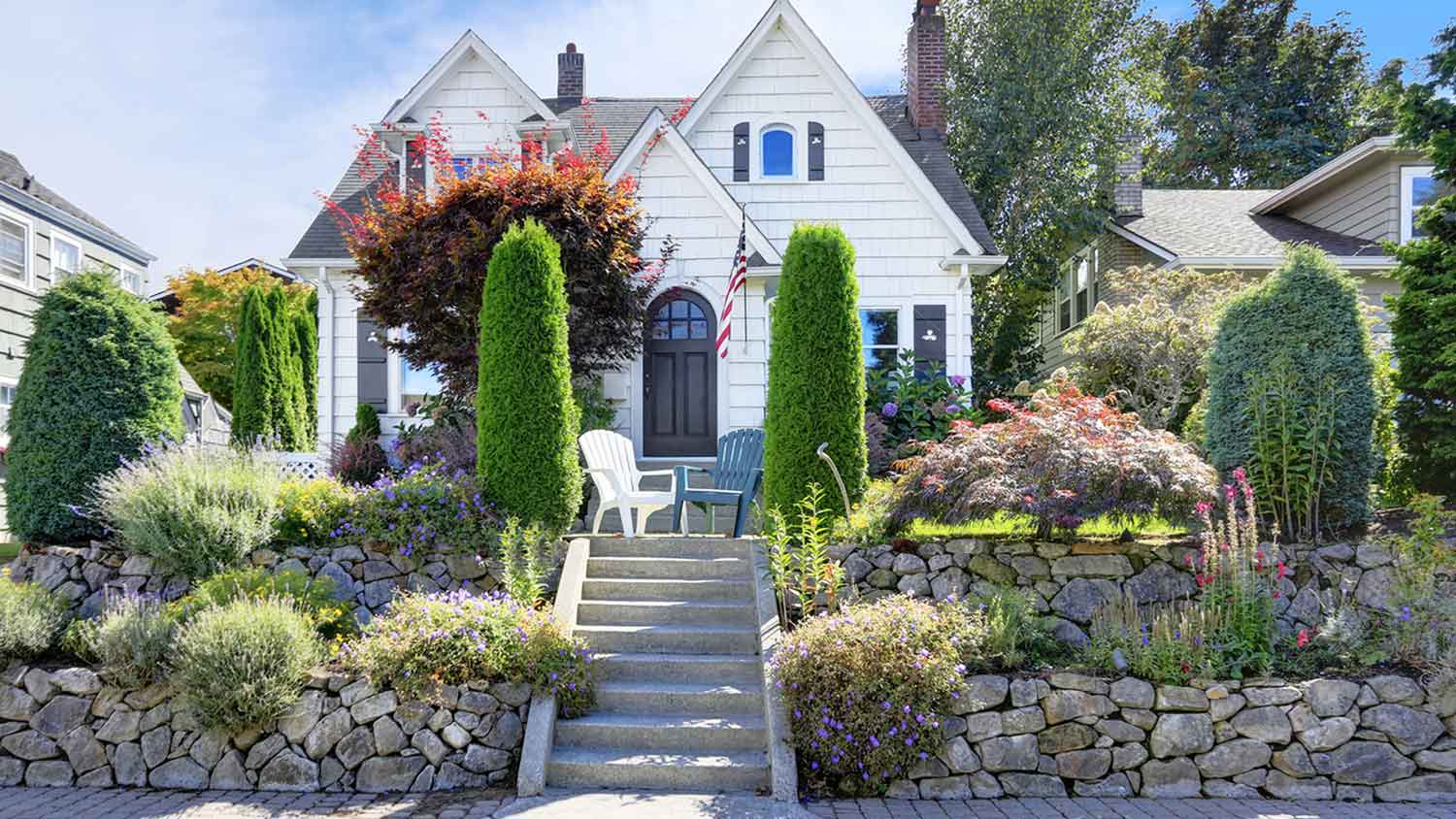
Retaining wall repair cost can vary widely based on the age and condition of the wall being restored. Learn why finding the right pro is important for getting the job done.
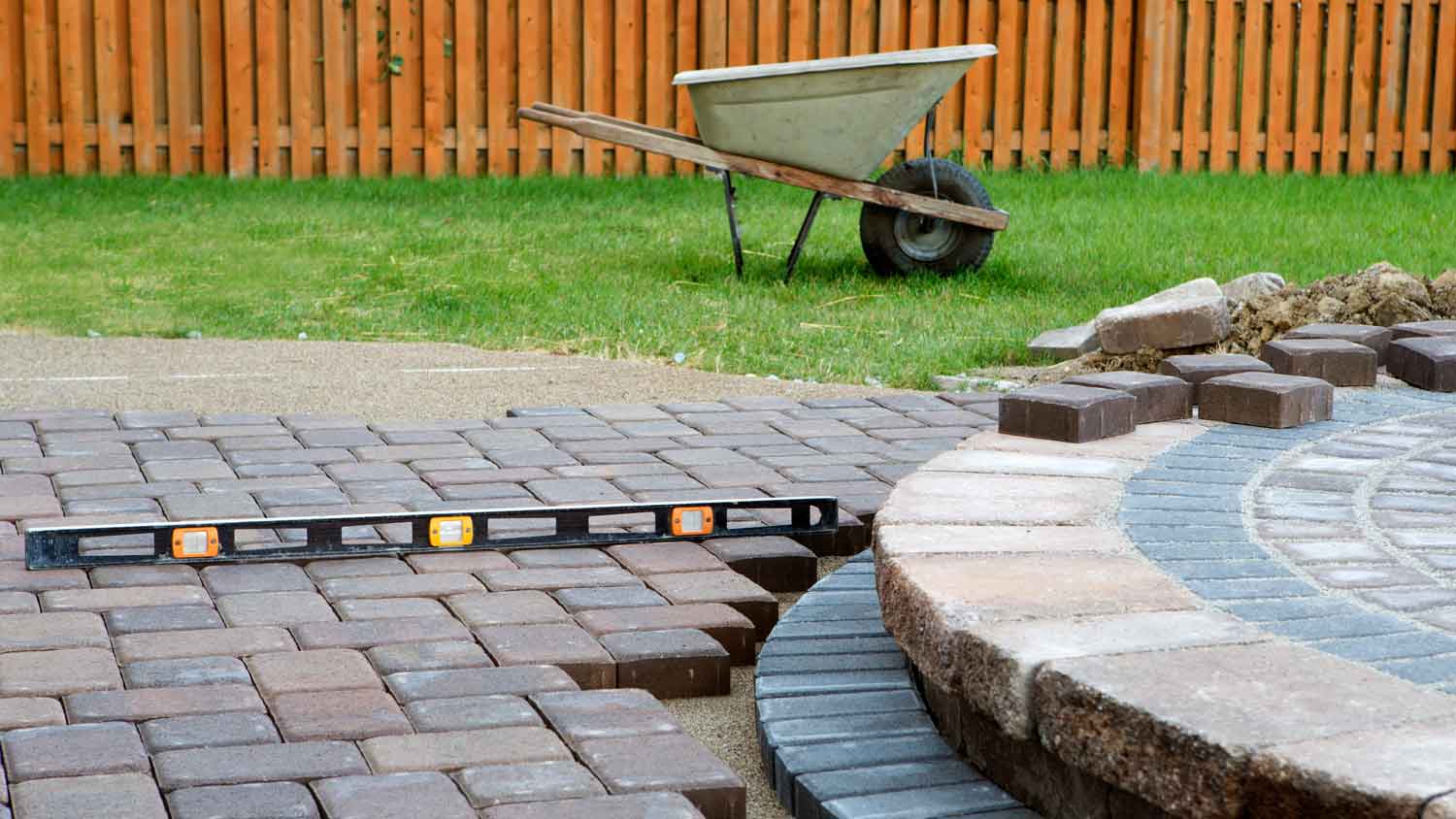
Learn how to fix your paver patio drainage problem by determining the source of the water that is flooding your pavers and causing sinking, cracking, and other issues.
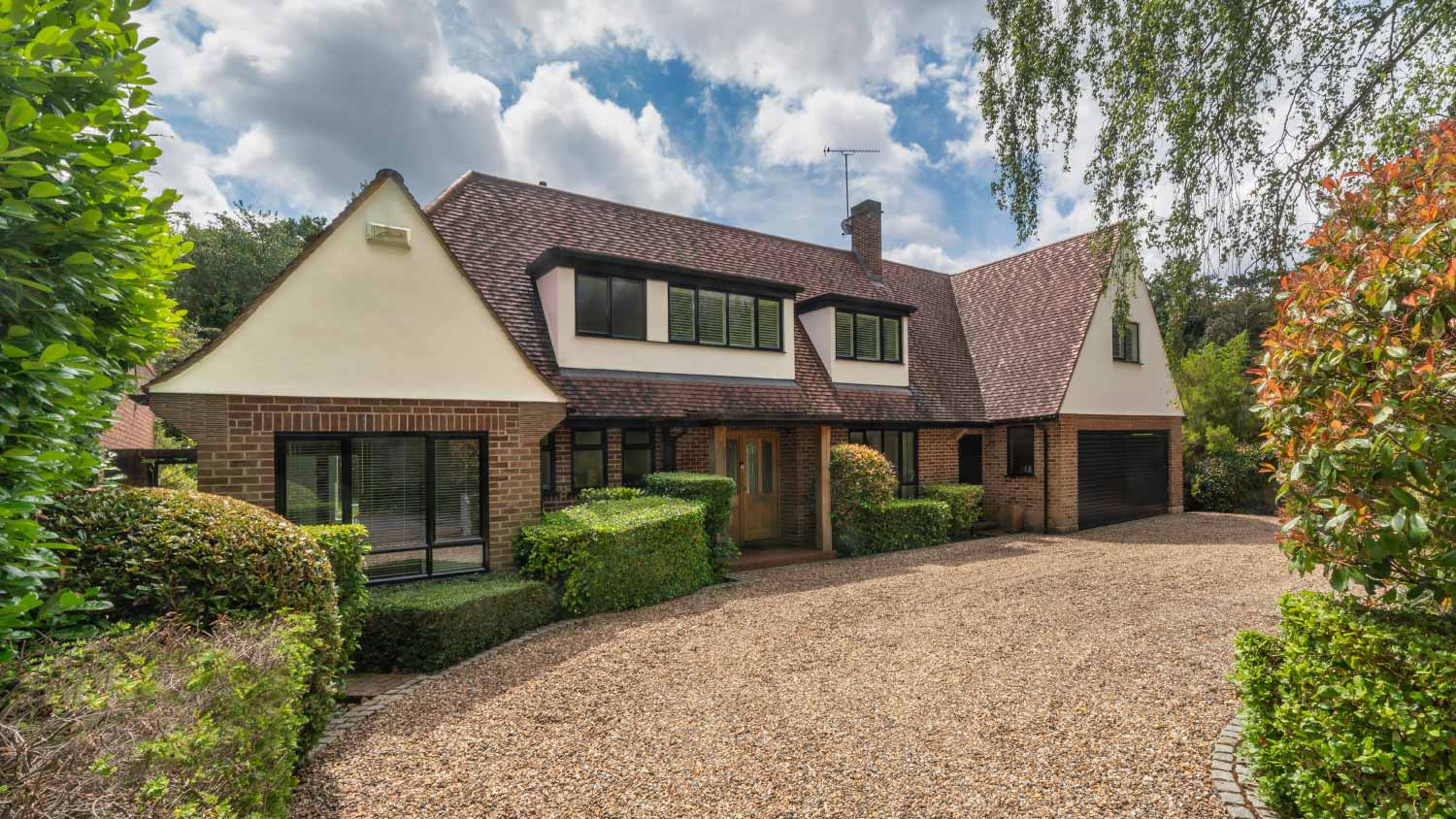
How much gravel do I need? It all depends on the area you cover and the gravel type. Use our gravel calculator to find out.
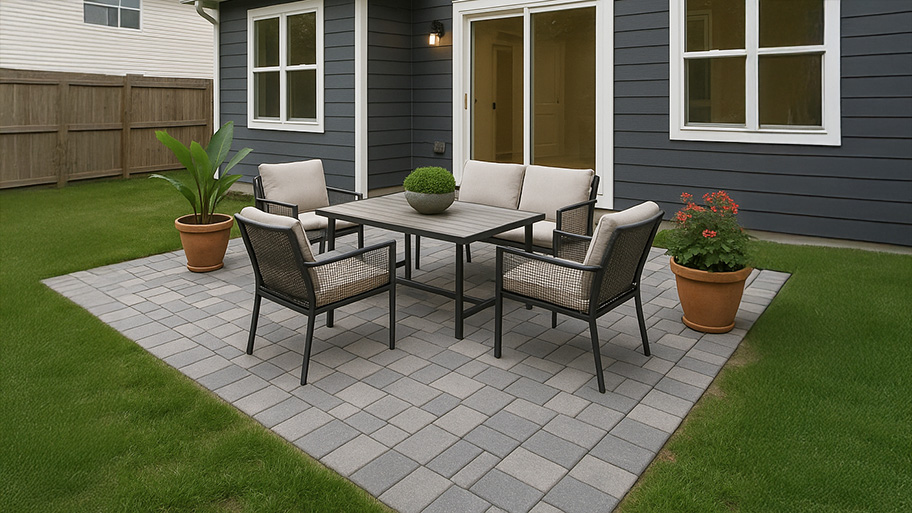
Grab a shovel, and maybe a few water bottles to stay hydrated, then learn how to install interlocking pavers DIY in this step-by-step guide.